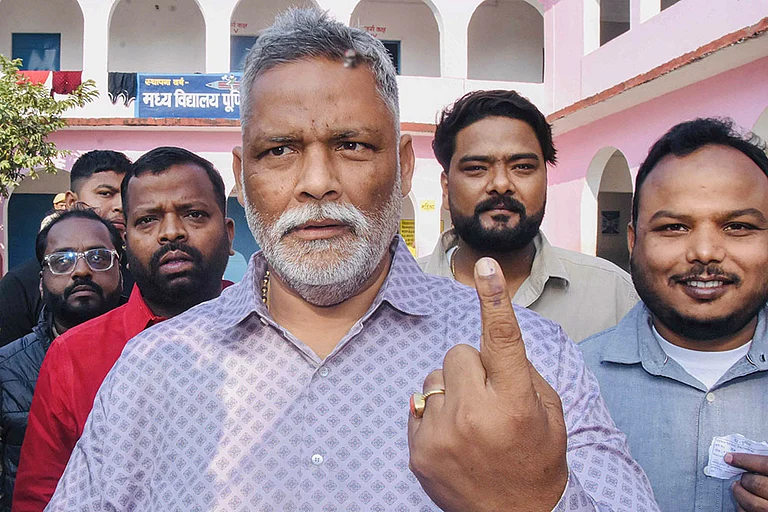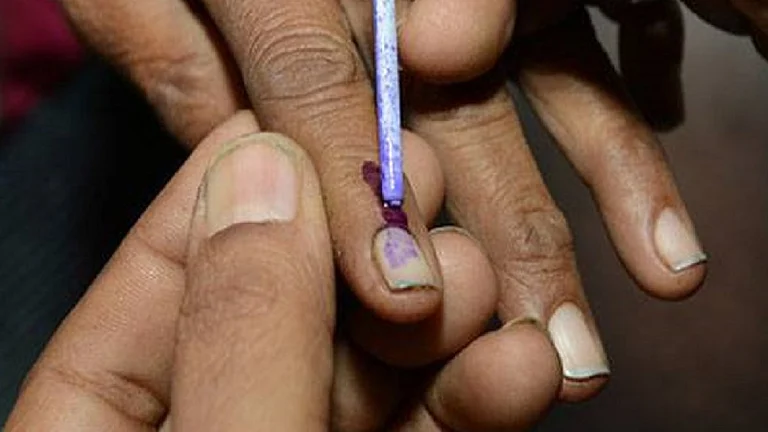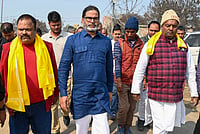On a hot October morning in Karpoorigram, Sangeeta Devi is among the thousands attending Prime Minister Narendra Modi’s rally, where he launched the Bihar election campaign of the NDA on Friday. The choice of venue—the village of Karpoori Thakur, one of the tallest backward caste leaders in the state—suggests that the NDA hopes to consolidate the backward caste vote.
Each time PM Modi praises the development work done by Chief Minister Nitish Kumar, Sangeeta nods hesitantly. She hasn’t come here so much to listen as to distract herself from something eating her up inside. She maintains a calm composure as I ask her about it.
“Liquor is easily available here despite all the talk of prohibition. You just need to bribe the police. My 16-year-old son fell into bad company and started drinking,” she says.
“He broke the phone I had bought on loan installments. When I scolded him, he went to the railway tracks to commit suicide. I can’t find him. I came here to distract myself from thinking about my only son,” she says, her eyes filled with visible pain—making me feel guilty for digging up her emotional trauma for journalistic purposes.
The 2016 liquor ban—once seen as a moral reform—has become emblematic of Nitish Kumar’s growing disconnect from the ground. What began as a populist policy has turned into a source of petty corruption and hypocrisy.
Sangeeta, who works as a cook in the midday meal scheme, is thankful to some extent to Nitish Kumar for increasing her honorarium from ₹1,650 to ₹3,300 per month. But that is still not enough to make ends meet. It is meager compared to the minimum wages set by his own government: ₹11,024 for unskilled, ₹11,440 for semi-skilled, ₹13,936 for skilled, and ₹17,004 for highly skilled workers.
The biggest problem in her life, however, is being landless. “Every now and then, the Rajputs threaten me and my family to vacate their land. This village is Rajput-dominated. They own most of the land. Where will people like me go? I keep pleading for a house under the Indira Awas Yojana, but no one listens to the poor here,” she says.
‘Jungle Raj’ Can’t Be the Standard for Measuring Governance
Devender Paswan, a daily wage worker, also sounds disillusioned. “Modi ji came, said his piece, and left. We listened to everything, but he never asked if we are actually getting the benefits of government schemes like ration or Indira Awas Yojana,” Paswan says with a straight face.
“We have to bribe ₹2,000 to get ₹10,000 from the government to build a toilet in our homes. The going rate is ₹10,000 to get ₹1,00,000 under the Indira Awas Yojana,” he adds.
“He used to say he’s allergic to corruption,” says Pinki Kumari, a teacher in Samastipur. “Now he’s silent when his ministers face charges. What has changed?”
The reactions of many voters are layered. Everyone I spoke to acknowledged the development work done by the Nitish government, which can boast a solid record: expanded roads, near-universal electrification, targeted welfare schemes for women, and improved school enrollment. Bihar is brighter at night than it was twenty years ago.
But they do not want the idiom of “Jungle Raj” to be the standard against which governance is judged. They are disappointed with the status quo—persistent corruption, lack of jobs, and a deteriorating law and order situation.
“We expected better from Nitish Kumar,” several voters in Patna and Samastipur told me.
In Ramna Road, the hub of Patna’s coaching centers, a tea stall outside one such institute is unusually quiet. The usual chatter about cricket or Bollywood has given way to weary talk about government jobs.
“We are studying for exams that never happen. Every time there’s a paper leak or delay. We’ve lost faith,” says Prakash Raj, a 26-year-old BPSC aspirant. “Nitish Kumar used to say education will change Bihar. Now even educated people are jobless.”
Across Bihar’s towns and villages, the feeling of being ignored runs deep. Two decades after Nitish Kumar promised sushasan, the electorate feels the state’s machinery has turned deaf. With less than two weeks to go for the state assembly elections, the fatigue is palpable.
The complaint of corruption is widespread. Irrigation projects remain half-built, hospitals short-staffed, and rural job schemes choked by graft. “The government is busy making announcements,” says an NGO worker in Darbhanga. “But on the ground, files move only when you pay.”
To be fair, this disillusionment is not the dominant narrative. Opinion is polarized: on one side are loud supporters of PM Modi, many of whom still caricature Lalu Yadav’s rule as “Jungle Raj,” and on the other are advocates of change within the Mahagathbandhan.
Jitender Kumar Yadav, a man in his late twenties, is a passionate supporter of PM Modi. “Modi ji is around. What couldn’t happen in the last 20 years will happen now. Jobs, industrialization—everything will happen. Modi has toh mum kin hai (is blessed).”
From ‘Sushasan Babu’ to Survivor
When Nitish Kumar first took charge in 2005, he inherited a state weary of Lalu Prasad Yadav’s fifteen-year rule, often caricatured as “Jungle Raj.” Nitish’s technocratic efficiency—better roads, improved policing, and bicycles for girls—earned him the title Sushasan Babu (Mr. Good Governance). For a while, Bihar seemed to have rediscovered order.
But the Nitish of 2025 feels distant from that reformer image. His constant realignments—from BJP to RJD and back again—have confused many voters.
Once hailed as the architect of Bihar’s turnaround, Nitish now appears to many as a tired caretaker of his own legacy—more concerned with survival than vision.
This silent discontent could redraw Bihar’s electoral map. But this alone will not decide the outcome. Caste arithmetic and Nitish’s “social engineering” can still fracture and counter public resentment. The careful implementation of targeted welfare schemes has helped keep anti-incumbency in check—at least for now.
For all its contradictions, Bihar remains a land of quiet resilience. The voter here is neither blinded by rhetoric nor completely disenchanted with hope. As the election draws near, many Biharis are asking not for grand promises but for attention — to their jobs, their wages, their dignity. Nitish Kumar’s challenge is no longer about defeating his rivals, but about convincing the people that he still hears them.




























